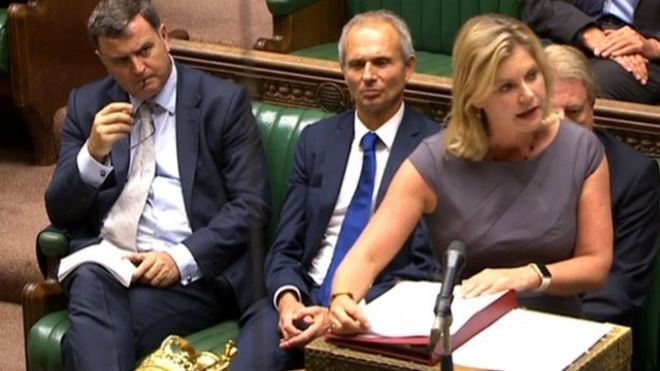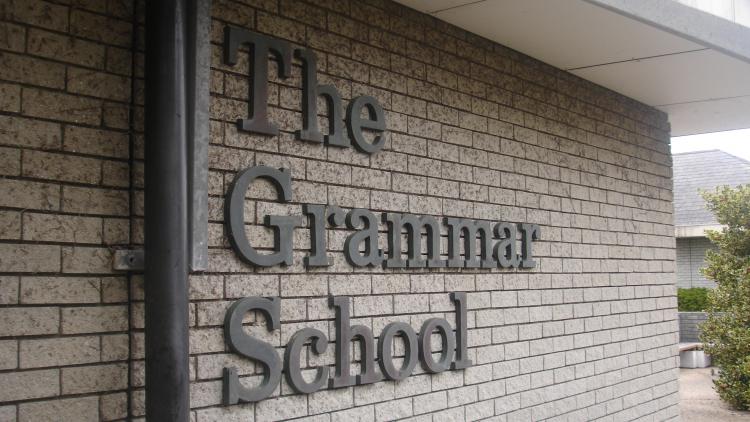
A new generation of grammar schools in England will widen access to good school places, said the education secretary – but Labour said they would produce more “segregation”.
Justine Greening told MPs expanding grammar schools would help families who could not afford to buy houses in the catchment areas of good schools.
Ms Greening said the proposals would create a “truly meritocratic” system.
But Labour’s Angela Rayner said: “Stop your silly class war.”
The plans for expanding selection in schools, announced by the prime minister last week, have been presented to Parliament.
‘Meritocratic’ or ‘segregation’
Ms Greening said it would increase the number of good school places and make sure there is a school system that “works for everyone, not just the privileged few”.
Labour’s shadow education secretary Ms Rayner said the new mantra of the Conservative party should be “segregation, segregation, segregation”.
And she asked the education secretary to explain who would decide which non-selective schools should be able to convert to become selective.
Ms Greening said: “We want to look again at selective schools and how they can open up excellent places to more children – particularly the most disadvantaged.
“We will therefore look at how we can relax the rules on expanding selective schools, allow new ones to open and non-selective schools to become selective where there is a demand.”
The plans were challenged by former education secretary Nicky Morgan who asked how creating more grammar schools would help pupils who were already underachieving or in schools that were underperforming.
Mrs Morgan’s own flagship education policy – forcing all schools to become academies – was sunk this year by a backbench rebellion by Conservative MPs.
But another former education secretary, Michael Gove, gave his backing to the plans.
‘Distraction’
Another former Conservative education secretary, Ken Clarke, cautioned on the impact on those pupils who did not get into a grammar school and urged that it should not “distract from raising standards”.
Former shadow education secretary Lucy Powell said the school system should be based on examples, such as London, which had many successful schools without selection.
Conservative backbencher Keith Simpson said he was uncertain about putting an emphasis on grammars, rather than focusing on the achievement of mainstream schools.
But Conservative Edward Leigh backed the government plans, saying it was “perverse” not to allow good grammars to be able to take more pupils.
And he supported the removal of the cap on faith group places in free schools – saying that it had been a mistake from the outset.
If the government faces rebellions from its own MPs over grammars, there will be questions on whether the Scottish National Party would vote on this English issue.
The party has kept its options open so far, saying: “We will closely examine any proposals brought to the House of Commons to identify any potential impact on Scotland’s budget.”
But Lib Dem leader Tim Farron has written a warning to Conservative MPs saying that the proposals for grammars could be as damaging to them as tuition fees were to his own party.
He said more admissions tests would not be popular with voters, who could find their children without places in a school which had become selective.
‘Stretching the brightest’
Kevin Courtney, leader of the National Union of Teachers, said: “This is a backward-looking policy. Promoting grammar schools as the elite academic option instantly casts all other schools into the role of supporting actor.”
Head teachers’ leader Russell Hobby said the “rhetoric does not match the reality” with grammars and “social mobility will be reduced, opportunities will be narrowed and life chances will be limited for the majority of pupils in this country”.
A report published by the Institute for Fiscal Studies concludes that grammars can”stretch the brightest pupils, but seem likely to come at the cost of increasing inequality”.
The think-tank study argues that grammars do well for those who get places, but those who do not get in are likely to do “worse than they would have done in a comprehensive system”.
The education proposals include:
- Existing grammar schools in England to be allowed to expand, backed by £50m of new funding
- All state schools in England will be allowed to select pupils by academic ability “in the right circumstances” and where there is demand
- All selective schools will have to meet access conditions, such as taking a share of pupils from low-income backgrounds, setting up a new non-selective secondary or primary school or backing an underperforming academy
- Universities will be expected to sponsor a state school or set up a new free school as a condition of their ability to charge higher tuition fees
- The rules for faith groups opening free schools will no longer mean that they can only allocate 50% of places to people within their own faith community – they can give all places on grounds of faith
- Independent schools will have to play a bigger part in supporting state schools or sponsoring free schools, in return for maintaining their charitable status. [Source:- BBC]







